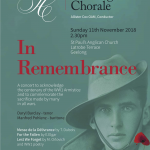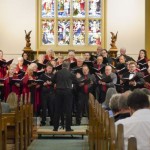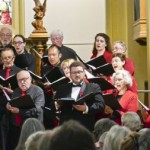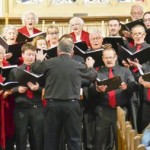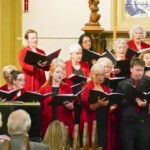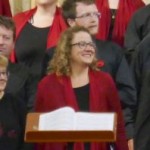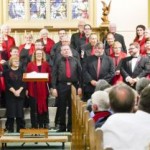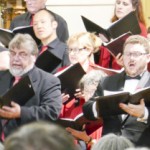The Geelong Chorale presented a concert to acknowledge the centenary of the WW1 Armistice. Sunday 11 November 2018, 2:30pm, St Paul’s Anglican Church Latrobe Terrace, Geelong
Reviews:
The Choral Grapevine: In Remembrance: Sunday, November 11, 2018
https://thechoralgrapevine.wordpress.com/2018/11/11/in-remembrance-sunday-november-11-2018/
Entertainment Geelong: https://entertainmentgeelong.com/reviews-2018
A concert of additional significance
In Remembrance, presented by The Geelong Chorale, director AllisterCox, St Paul’s Church, November 11, 2018,
The date, November 11, 2018 marked 100 years since the signing of the armistice that brought an end to the Great War.
It was commemorated in Geelong with two extraordinary musical concerts held in different churches, both chosen for their acoustics rather than secular symbolism.
The first, held on the evening on Friday November 9 in St Mary’s Basilica is reviewed below.
This, second concert, was held on the afternoon of the date itself, November 11, in St Paul’s Church.
Although organised separately and by different groups, the concerts shared similarities. There was a core of singers involved in both events, but that was hardly surprising, considering that they sought to recruit the best available voices in our region.
They shared a common format, in linking the music with the recitation of poems written at the time. And both concerts used Wilfred Owen’s Anthem For Doomed Youth and Edward Elgar’s For The Fallen as early introductory works.
But there the similarities ended.
For where the St Mary’s concert had chosen to illustrate the war’s massive orgy of death and destruction in its selection of works, this concert chose to celebrate the peace that followed the armistice’s signing.
As such, the two concerts actually complimented each other, both musically and historically.
This one, organised by The Geelong Chorale with its conductor Allister Cox and guest soloists, consisted of two major works written four years apart – either side of the war – to illustrate the emotions at those times. There were other, smaller works adding contrast and colour.
The afternoon’s theme was set by the Chorale’s Tim Gibson, released from his singing duties to read selected poems with gravity and clarity. He opened the concert by reading Siegfried Sassoon’s poem Aftermath. This was followed by the chorale singing Matthew Orlovich’s Lest We Forget before Tim read For The Fallen, containing the now-immortalised lines ‘age shall not weary them, nor the years condemn..’ put into its correct context.
This led to the Chorale singing Owen’s Anthem for Doomed Youth before delivering Elgar’s For the Fallen in full, with all of its dark, challenging complexities. This mammoth piece was faultlessly delivered by the Chorale and soprano soloist, Fiona Squires, accompanied by Kristine Mellens’ piano and with input from Jess Morris’ clarinet.
Then, following a short interval, the concert’s second half was almost entirely given over to Theodore Dubois’ Messe de la Déliverance, written to thank God for bringing peace at the war’s end.
This work’s seven segments of soaring praise and triumphal hosannas not only contrasted what had gone before, it was delivered in Latin with plenty of sacred musical complexities.
And the Chorale delivered a near-faultless performance, accompanied by Beverley Phillips at the church’s organ, with two excellent soloists in tenor David Campbell and baritone Manfred Pohlenz.
In an unusual touch, David and Manfred, while seated in front of the Chorale between their solos, joined in with its male voices in their big choral movements.
And together, they sent the Chorale’s voices – and that sacred thanks – soaring and resounding through the venue’s excellent acoustics.
And it brought such a suitable, and memorable, end to the weekend of remembrance.
– Colin Mockett
Images

